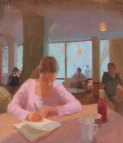Live At The Scene
Making your script visually engaging is very important, so here’s one tactic to try when setting a scene.
Put yourself in the situation. Literally.
Let’s say that your characters are meeting in a café. You know what a café looks like, you’re in one several times a week. That might do, but why not go one step further?
If your current environment is sapping your creative flow, take yourself to a scene that you use in your screenplay. Once there, you’ll begin to pick up on the little things, nuances that can really make your fictional locations sound more authentic. Take in the aroma, study the clientele, wobble the table. It won’t all be stuff you’ll use, but it will add detail.
Of course, don’t go driving around just to find the cathedral that your protagonist’s dog runs past, but when you need to get out the house and clear your head, then try delving in to your film world. You don’t necessarily have to write while you are there, but at least take notes. You never know, overhearing a certain conversation or perhaps witnessing a kitchen mishap may help you to replicate that believable café environment.
And it doesn’t just apply to places. I’ve started editing night scenes in the early evening, as working after the sun has set just feels different, and with it comes a different approach to writing.
It can be hard enough just finding the time to write, but at least this way you can build parts of your script around your daily routine.
Just be careful if your character is a drunk.
And stay away from volcanoes.
Happy writing!


This is great advice that works for more than just script writing! We always hear the saying “write what you know” and most of the time we take it to mean situations, plots, character traits and whatnot, when in truth it means a whole lot more than that. We experience things like sitting in a cafe everyday but we don’t usually soak it all in. Sometimes, in order to notice those little details that we usually ignore, like the wobbly table, we have to surround ourselves with them and consciously take notice. Putting yourself in your characters’ shoes is always a good idea!
Great post and comment! “Write what you know” is so important to making a scene feel real. Those little details make all the difference to someone who really DOES know that cafe, etc.
I hadn’t thought of going to some of the places I write about, but I certainly could. I’m going to have to try this, thanks for the idea!